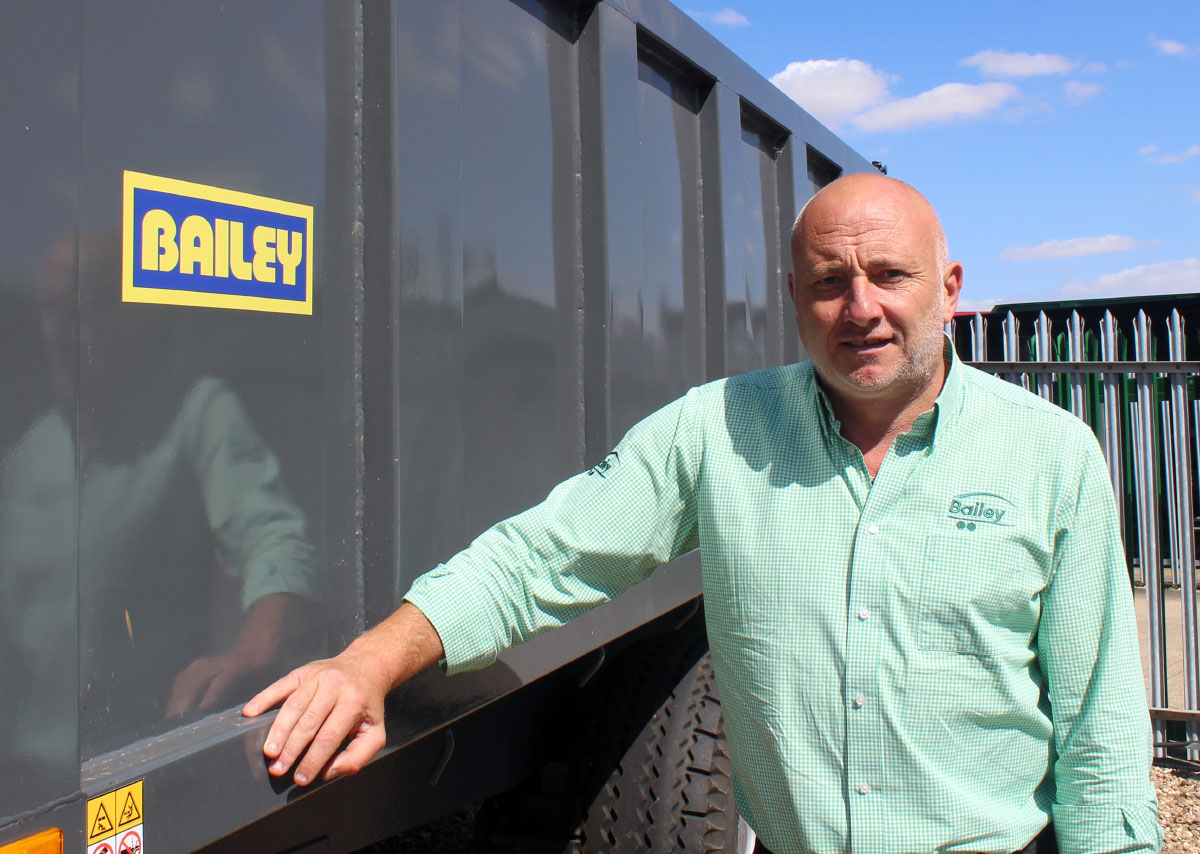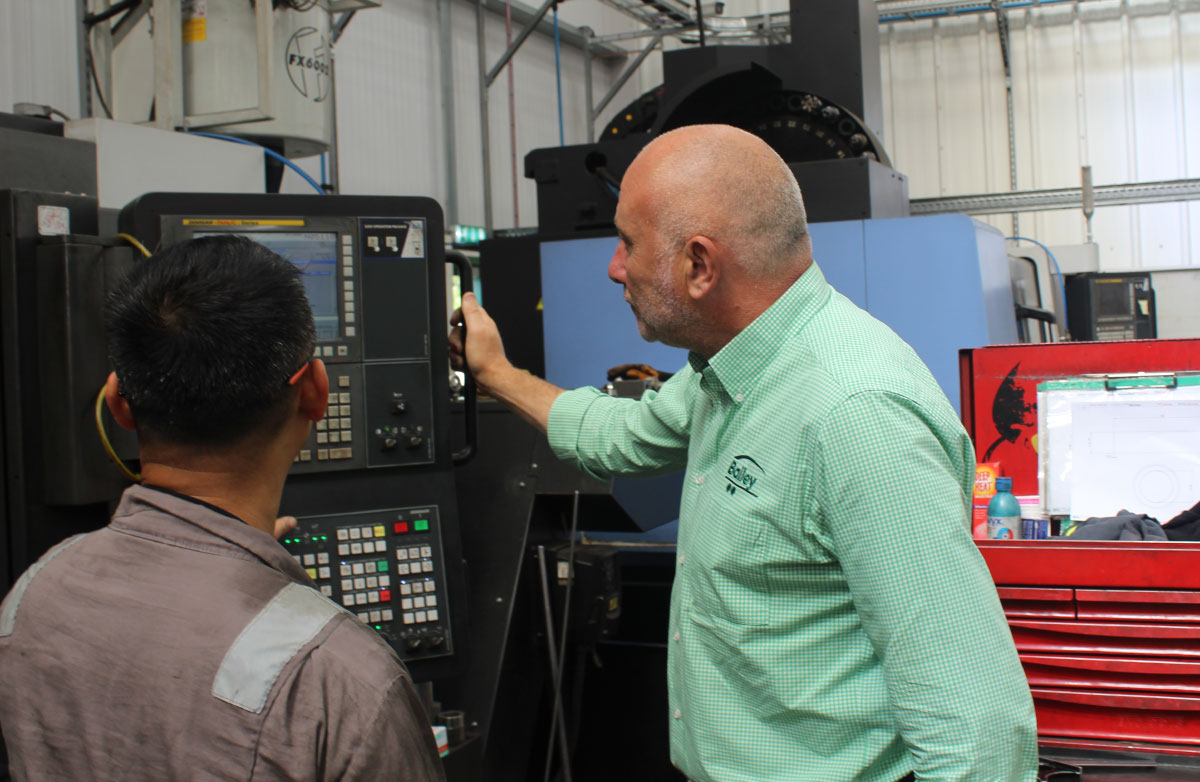
Managing Director Michael Bailey shares his thoughts on 40 years of Bailey Trailers, the UK agricultural market and why he believes that Bailey are well positioned to weather any economic storm that may be brewing.
Congratulations on 40 years of Bailey Trailers this year. How does this make you feel?
“I feel proud to be part of it. If you asked my father when the first trailer rolled off the production line 40 years ago if he could have envisaged where we are today, he wouldn’t have thought it possible. We’ve come a long way, we’re still a family firm, there’s a next generation working here and that’s how we want it to be.
“The very first trailer sits proudly outside our reception. However, sometimes we take it to a local customer’s and it helps out with harvest. Just the other day I took a load of corn in with it and I thought how ever did farmers sit in a tractor pulling a ten tonne trailer with no sprung drawbar or fancy suspension? In its day it was a real game-changer, but things have moved on leaps and bounds.”
What sets Bailey apart from other trailer manufacturers?
“I would like to think it’s the quality of the product, we try to stay at the top of the market. The back-up we provide, we’re always there for our customers and dealers. We listen to people and keep looking for new ideas, new technology to improve our products, whilst keeping the price as competitive as possible to help farmers.
“We believe a lot more in core values, family values. Those same values that drove our business when we started still drive us today and in a world of mergers and mass production I think it’s very important to stay true to your roots. To offer something different.”
What are your biggest challenges?
“The biggest single challenge we face at this factory is labour. We’re finding it increasingly difficult to find people. For example, welders, go back a couple of years and if we whispered we’d got a vacancy there’d be a queue, now if you shout you’re lucky to find someone.
“People don’t want to work like they used to, everybody wants more money but they don’t want to put the hours in. We’re not unique, you see it on TV every day and I talk to other business owners and hear the same stories. It’s easy to hide behind Brexit and COVID, but I think there’s more to it than that, I’m not sure what though. On the flip side we’re lucky that we have a nucleolus of good people here, we’d just like to add to their number and take the pressure off.
“The volatility of price and availability of raw materials has been a challenge of late, there have been times we have struggled to source one or two components. The knock on effect is a delay in production, which has added two to three weeks on occasion. If you know in advance you can plan for these issues and work round them, it’s when you receive a call half an hour before a delivery is expected telling you it’s not coming for three weeks that causes unnecessary problems.”
What are your thoughts on the UK market over the next 12 months?
“Within agriculture I think it will remain quite buoyant. The yields, particularly in Lincolnshire from what I’ve heard have been much better than expected this year, the price per ton is healthy. Farmers have had a relatively low input harvest season because it’s been so dry, they should have seen some decent savings.
“The UK economy is going into a period of recession. We’ve seen recessions before and we’ve come through them. There’s a lot of things people can manage without but they still have to eat.
“At Bailey we’ll keep our heads down and carry on supporting farmers as we have always done. Our business model is sound, we’ve invested a lot of money in our plant over the last ten to twelve years, the order book is looking healthy well into next year, we’ll carry on doing what we do best and see where it takes us.”

Your family were farmers, what would you like to see change within farming?
“Farmers for what they do, the time they put in and what they earn don’t get enough reward. One of the things that has always frustrated me is how a litre of milk can be cheaper than a litre of water. When you consider the amount of money invested by farmers in the product, when it leaves the farm it’s at the wrong money and that needs to change.
“Food has been too cheap for a long time; all farmers will tell you that. Pig farmers in particular have suffered over the last six to eight months, why pork has gone the opposite way to beef and lamb is beyond me? If supermarkets pay farmers a fairer price the industry would be in a far better place and it wouldn’t make too much of a difference on the supermarket shelves.
“We were praising our farmers through COVID but people have short memories.”
What drives you?
“To make sure the family and the next generation are provided for in terms of a healthy business. Looking after our staff and paying them well so that they can look after their families.
“My son is here, my brother Richard’s son and daughter are also in the business, I expect other family members may follow them. As much as the next generation are doing a grand job, you’ve still got to oversee things and make sure they are heading in the right direction.
“Keeping the product at the top end of the market. There are one or two manufacturers out there that give us a run for our money, we want to stay one step ahead and maintain our position as the biggest manufacturer in the UK providing the very best trailers.”
What’s next for Bailey Trailers?
“We’ll continue to find those marginal gains that improve our products across a range of industries from agriculture and market gardens to construction and utilities. I think there are one or two areas we could expand into and we’ll be looking at this.
“Back in 2009 we made the decision to move to Sleaford because we couldn’t produce enough trailers to meet demand. We’ve nearly outgrown this site and we’re getting to the point that without serious investment again we’re at full capacity. I don’t really want to split everything across two sites as that will be too much to manage. Land is becoming scarcer; we’re spread across 8 acres here so we’ll need a fair sized site to develop were we to move.
“It all depends on whether we decide that producing in the range of 35 trailers a week is enough or if we want to make that figure 40. It’s possible we could achieve this figure with clever use of space here and potentially acquiring a bit of land around us. All I can say is watch this space.




